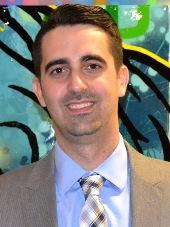AUTHOR: Elyse Rosa

Mark Tucci was a PhD student in the MiNDS program working with Dr. Henry Szechtman. Mark defended his thesis in 2014. While working with Dr. Szechtman, his PhD work focused on the neurobiological and behavioural correlates of obsessive compulsive disorder (OCD) using a rat model. Since graduating from the MiNDS program, Mark moved on to a post-doctoral position at the Sunnybrook Research Institute, and more recently began a new line of fascinating work partnered with the Ontario Brain Institute. Mark took some time out of his busy schedule to answer a few of our questions about how he transitioned from a MiNDS student to his current position.
A. Presently, I hold the title of 'entrepreneur' and I am funded by the Ontario Brain Institute. My job is to take neurotechnology developed in the laboratory, and make it accessible to potential users by commercializing it. Some of the MiNDS students may be familiar with my co-founder, Dr. John Connolly, as he is a MiNDS faculty member. Each day I may wear a number of different hats. I spend a lot of time testing patients in and out of the laboratory to build our data and validate the technology. I also attend business meetings with potential partners and stakeholders where I try to explain the value of this work to them. I still chase funding opportunities, albeit from a commercial perspective rather than academic. And of course, I still look at stats! Being an entrepreneur is not really something you can prepare yourself for. I know courses exist for it, but it really is about immersing yourself in the business world, and having a solid team of mentors to help you navigate the waters.
Q. In what ways do you feel that the MiNDS program helped prepare you for your current position?
A. I was lucky to have an amazing supervisor and mentor in Dr. Henry Szechtman. Virtually everyday I apply something that I learned from him. The knowledge you gain from your supervisor will help build you both as a researcher and person, and will be invaluable going forward. Additionally, the MiNDS program was very open to non-traditional career options for students. I can recall a number of speakers and events that leaned towards industry rather than academia. This was very important because it opened my eyes to other possible career paths besides academia—which we all know is so hard to get! The MiNDS program was very forward thinking on industrial alternatives and knowledge translation.
Q. Could you elaborate on how you went from being a MiNDS student to the position you have today?
A. As I transitioned out of the MiNDS program, I accepted a combined post-doctoral fellowship and business internship at the Sunnybrook Research Institute (SRI). I'll be honest; it was the business internship that I was really interested in. The neat thing about the SRI was that they really pushed commercialization of their research findings. As an intern, I acted as a scientific liaison for one of the start-up companies based out of the SRI. This was a great experience and it gave me a taste of the business world. Around this time, I was talking with Dr. Connolly about his work, which I always found fascinating. He mentioned that he was interested in trying to commercialize his technology. We built a relationship and applied for various grants to start our venture. Currently, we use each day as an opportunity to push the venture forward to become a successful business.
Q. What were some of your fondest memories of being a MiNDS student?
A. One of my fondest memories of being a MiNDS student has to include playing baseball with some of the other students. We always had such a competitive team but just couldn't seem to beat the Phoenix to win a championship. This was a great way for us to all get to know each other outside of the lab, and unwind after a long day of work!
Q. Do you have any advice for current MiNDS students who are unsure of how to translate their current research interests into a potential career path?
A. I think the most important thing that I can tell current students is to get out there and network. I was unsure as to what I wanted to do for a career. However, by networking I met many individuals who shared their journey with me and I began to get a picture of what I wanted to do. Your network might start with others in the MiNDS program like mine did. However, you really need to get out and grow as big a network as you can. You never know what will happen by doing this. I once volunteered at a health technology event where I handed out nametags. This is where I met a contact that led to my position at the Sunnybrook Research Institute. The MiNDS program provides many opportunities to network, but students should get out of Hamilton and attend events elsewhere when possible. A solid network will help you explore your potential career paths and may even help you land your first job!